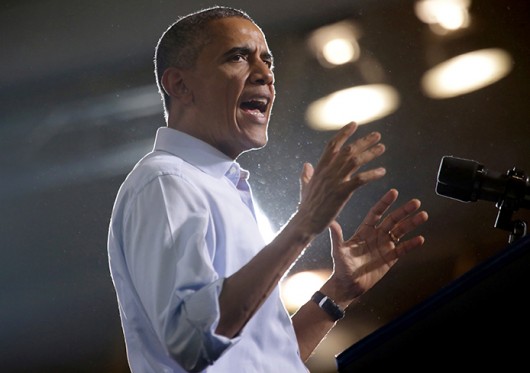
President Barack Obama speaks at the Democratic campaign rally on Wayne State’s campus in Detroit on Nov. 1, 2014.
Credit: Courtesy of TNS
I think it is safe to say I am one of the few Americans who respects President Barack Obama, is sympathetic to a reasonable chunk of his agenda, is disheartened by the near-constant opposition to him by Republicans in Congress, and who thinks his Iran deal is 100 times worse than Donald Trump’s hairdo.
On many fronts, President Obama has worked hard to reshape the national agenda. At least in spirit, he has done a great deal to move the country forward. His regard for tackling income inequality, promoting criminal justice reform and increasing college affordability is commendable. Whether it be the Affordable Care Act expanding access to healthcare for millions, or the Dodd-Frank Wall Street Reform and Consumer Protection Act doing more to protect consumers from Wall Street recklessness, or his countless speeches promoting common-sense gun reforms like universal background checks, the administration is quite capable of doing a decent job. The administration has shown leadership on LGBTQ issues, on immigration reform and on expanding the military and intelligence relationship with our allies like Israel. On some foreign policy matters, such as Cuba, commencing new relations has the propensity to benefit both nations. President Obama has also done well to open up dialogue and carry the conversation on race issues.
I oppose his Iran deal because I genuinely believe the administration can do better. In my heart, I know it can. I have seen how successful their messaging can be, how much concern they have shown for pressing issues and how much they have tried to forge bipartisan agreement, and am dumbfounded they seemingly dropped the ball during Iran negotiations. The president has done well on many other issues, and he should have done better on this. I am disappointed. The administration should have insisted on more dismantlement of Iran’s nuclear infrastructure, not simply put it in storage until the deal’s sunset provisions kick in. It should have required Iran to change its rhetoric and behavior and come clean on its past weaponization efforts. The current deal does not do so. Iran is the largest state sponsor of terrorism in the world, as its tentacles of terror stretch from Yemen to Syria, to Lebanon to Iraq — where they currently sponsor terror, often against fellow Muslims — and to Argentina and to Bulgaria — where they have sponsored attacks against Jews in the past — and to our nation’s capital — where, in 2013, they attempted to assassinate the Saudi ambassador. The current deal provides upfront, rather than gradual, sanctions relief, to the tune of around $150 billion in the first year alone. It is difficult to deny that Iran’s support of terror and unrest will only increase with this newfound wealth.
In Washington, ill will exists on all sides. The administration never trusted Congress to scrutinize a deal on the merits only, outside of the usual political gamesmanship, and that is precisely why the deal was not submitted to Congress as a treaty; Congress never trusted the administration to acknowledge its objections and factor outside views into the negotiations.
Among supporters and detractors of the deal, most had their positions staked out long ago, along partisan lines. Many Democrats, looking to afford President Obama a foreign policy victory, and to avoid seeming disrespectful or undermining him, would blindly support any deal, no matter the content. Many Republicans, on the other hand, view this administration with extreme hostility and mistrust, and would oppose any deal reached, no matter the content, simply to deny the president a foreign policy victory. In both instances, judging the deal on its merits is not on the menu, and that’s a shame.
Many opponents of the deal fail to recognize the administration’s good intentions, instead promoting ad hominem attacks against President Obama, Secretary of State John Kerry or the negotiators themselves. These opponents also fail to acknowledge the hard work of the negotiators and fail to see, or to believe, the administration worked toward a good deal. On the flip side, the administration has exhibited extreme naiveté in believing Iran will somehow radically moderate its behavior under this regime, end its vociferous support of international terror and become a Middle Eastern form of Sweden or Norway. The President is naïve to believe Iran will quickly reverse its pariah-state behaviors, be a force for good in the region and become a reliable American partner.
On the Iran issue, my support and respect for the president on domestic and other foreign policy issues has little bearing. My opposition to this deal has no relation to healthcare, gun control, Cuba, and other issues, as it shouldn’t. What does access to affordable healthcare have to do with the Iran deal? What does college affordability have to do with the Iran deal? What does criminal justice reform or race issues have to do with the Iran deal? Because America has become so polarized, it is assumed if I support the president on one issue, I support the president on all issues, and vice versa. It is time to separate issues. Opposing the Iran deal should not imply I do not like the president. I oppose the Iran deal on its merits, regardless of my support for the president’s position on other unrelated issues. I implore the president and the administration to do better because I know it can.
Andrew Podob
First-year Ph.D. student in American Politics, The Ohio State University


